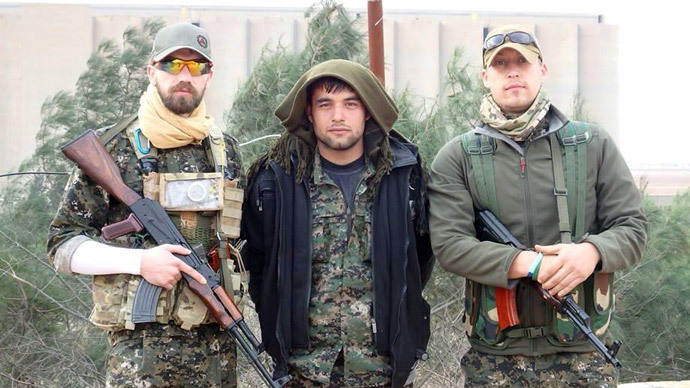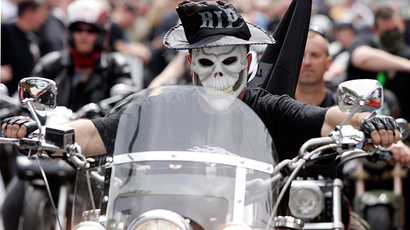Int'l anti-ISIS brigade: Westerners flock to fight for Kurds

People from the US, Canada, the UK, Germany and other western nations are fighting in Syria and Iraq, where Islamic State militants want to create a state of their own. But they're not jihadists – they're going into battle on the side of the Kurds.
The latest report about western volunteers, many of them with
military backgrounds, comes from the UK. James Hughes, a former
British infantryman with three tours in Afghanistan, has joined
the Kurdish People’s Protection Units, the YPG, to fight against
the Islamists.
His friend Jamie Read, a French army-trained soldier, is with
Hughes, according to a report in the UK's Observer newspaper.
Both were apparently recruited by an American called Jordan
Matson on behalf of the “Lions of Rojava”, an YPG media
outlet.
Hughes and Read are among many westerners, who have gone to the
turbulent Middle East region to join the fight against the IS,
formerly known as ISIS, and Kurdish militias.
There are Americans Jordan Matson, an early US Army discharge,
and Jeremy Woodard, an Army veteran with tours to Afghanistan and
Iraq. A group of six unidentified Canadian special forces
veterans reportedly fighting for Iraqi Kurds Peshmerga. And Gill
Rosenberg, a Canadian-Israeli woman credited to be the first
westerner to join YPG’s female squads.

There are two biker gangs, one from the Netherlands and another
one from Germany, which sent some of their members to join Kurds,
An Qassim Shesho, a German of Kurdish dissent who took his son
Yassir Qassim Khalaf and left peaceful Europe to help his fellow
Kurds in Syria, and many others.
Flashpoints across the globe tend to lure foreign fighters, and
the Iraqi-Syrian turmoil is no different. Motivations for making
a war in a foreign land your own may vary greatly. Some feel it
their duty to risk their lives for a just cause. Some feel the
conflict is not foreign to them at all, as is the case for Kurds
from Turkey or Europe or America going to Syria.
There are also thrill seekers going into the fray for the
adrenaline rush and a chance to kill or be killed without a jail
term as a consequence. There are also professional wild geese,
taking pay checks for "wet work."
Unlike hundreds of people from western countries who are taking
part in the conflict on the side of the IS, westerners allied
with Kurds are not risking repercussions at home. Western
governments discourage their citizens from joining the fight, but
indicate that they would avoid prosecuting them for fighting
against ISIS.
UK PM David Cameron, whose government has inked new
anti-terrorist laws that would allow the revocation of
citizenship from British jihadists returning from Syria, said
there was a “fundamental difference” between them and
those fighting for the Kurds, and pledged that the British border
staff would be able to tell one from the other.

“UK law makes provisions to deal with different conflicts in
different ways – fighting in a foreign war is not automatically
an offence but will depend on the nature of the conflict and the
individual’s own activities,” the Home Office said in a
statement.
Dutch prosecutors warned their fellow citizens, including the
biker gang, that “'Joining a foreign armed force was
previously punishable, now it's no longer forbidden. You just
can't join a fight against the Netherlands.”
The latter may be somewhat tricky, since the Kurdistan Workers'
Party, the PKK, which is involved in fighting against ISIS in
Syria, is considered a terrorist organization in Turkey, where it
has been fighting for independence of Kurds for decades, and some
western nations, including the Netherlands.
Apparently, when it comes to foreign fighters in various
conflicts, these governments prefer a realpolitik approach. For
instance, Russian volunteers going to Ukraine to assist the local
militias in battles against Kiev’s troops shelling Donetsk and
Lugansk are considered a form of a military invasion on the
orders of the Russian government. But Americans and Britons
fighting in Syria against the enemy of their governments are not.
The US-led coalition maintains that it would not have boots on the ground in Syria or Iraq doing combat missions. At least not officially. According to a Daily Mail report, British SAS have been ambushing IS fighters in Iraq for at least a month – killing as many as 200 in the operations.














